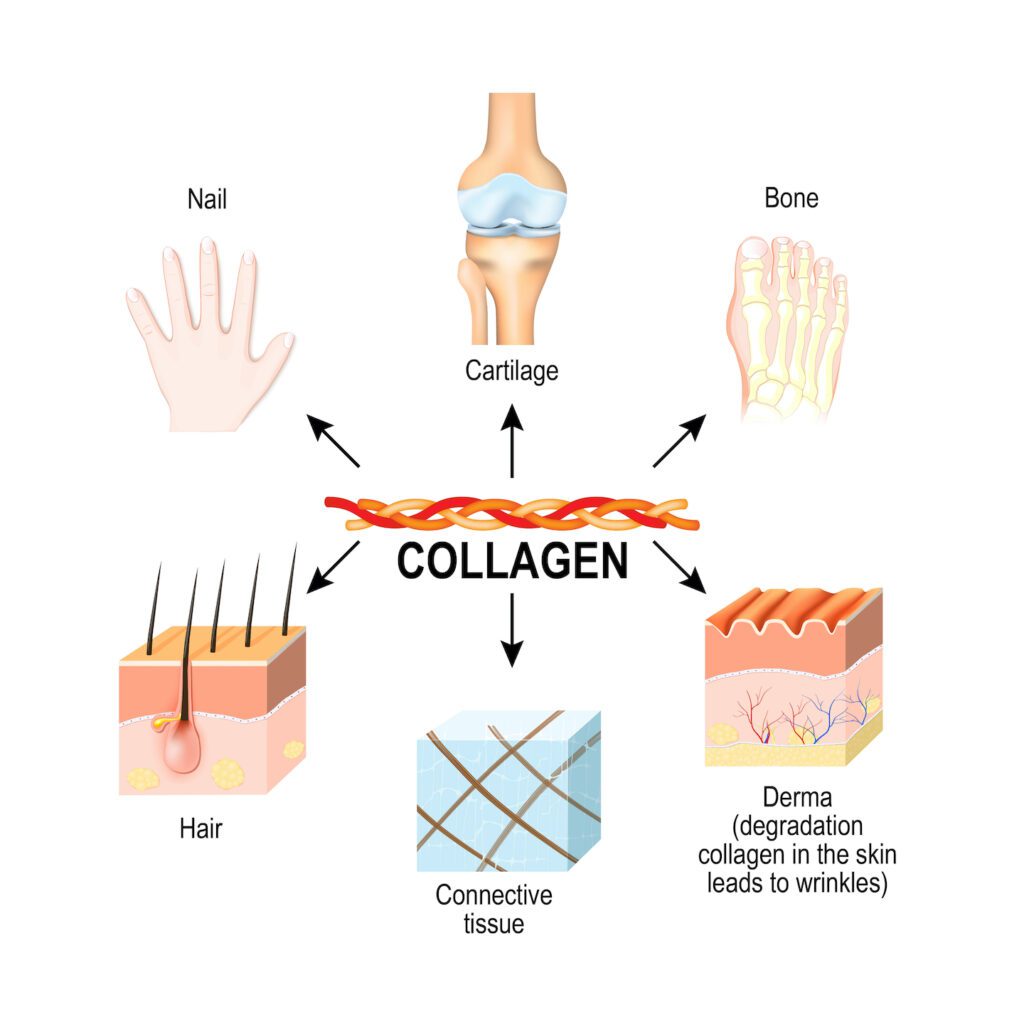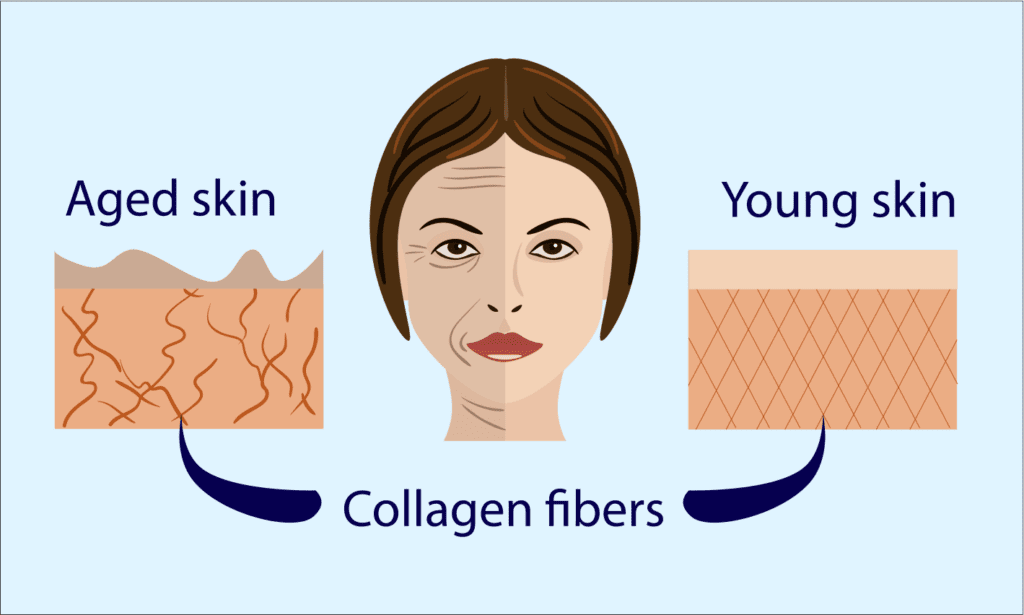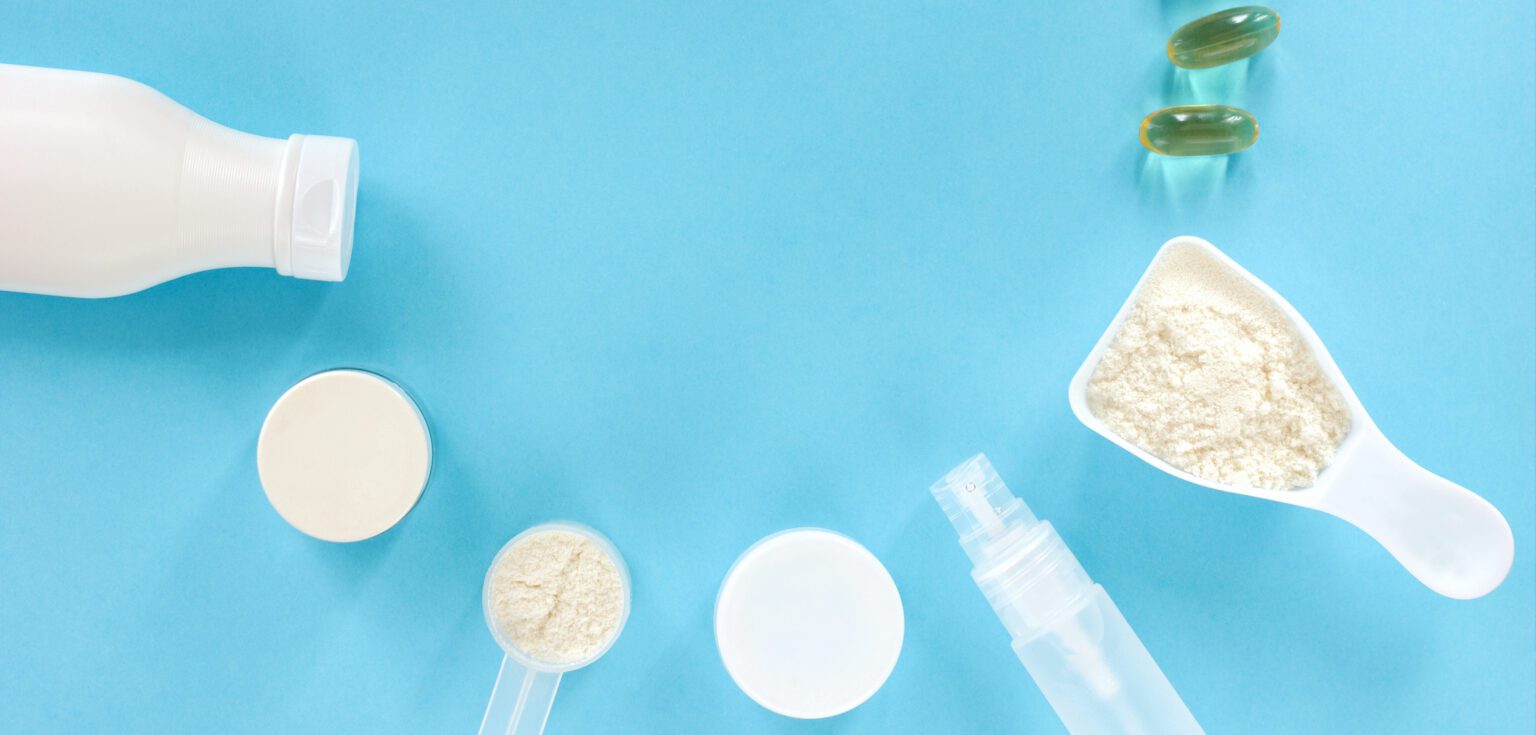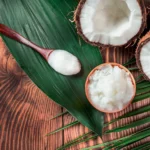When it comes to collagen, what is the difference between collagen types and which one is right for you?
Collagen is the ultimate buzzword in skincare and nutrition. It can be found in several supplements due to its number of essential bodily roles. Some people swear by its beauty benefits; smoother skin strengthened nails and strong, shiny hair. Others prefer the gut health perks as it improves digestion. It is indisputable that collagen is good for you.

Determining which type of collagen is best for you can be confusing. As these questions commonly come to mind:
- What is the difference between collagen types 1, 2, 3, 4, and 5?
- What is hydrolyzed collagen?
- Should you buy marine collagen or bovine collagen?
- Is liquid or powdered better?
We will break this down into an easily digestible guide to distinguish the benefits of the collagen types.
What are the different types of collagen?
Collagen comprises amino acids—hydroxyproline, glycine, and proline- a component of skin, blood vessels, and other connective bodily tissues. This collagen can be obtained through various sources such as chicken, bovine, fish, and eggshell membranes. There are also different collagen subtypes, with each source containing different types that benefit other areas of your health.
Here is a breakdown of the 5 most common types of collagen and their benefits:
Type 1:
- The most common type of collagen
- It makes up about 90% of our bones, skin, hair, nails, and ligaments
- Supports healthy and youthful-looking skin
- Marine collagen is a popular source
Type 2:
- It helps build and maintain our gut lining
- Supports joint and digestive health, promotes immune function
- Often made from chicken
Type 3:
- Generally found alongside type 1 collagen in smaller amounts
- Supports skin and bone health
- Also a part of arterial walls and is essential for cardiovascular health
- Bovine (beef) collagen is a popular source
Types 4 and 5:
- Less abundant in the body and less common in supplements
- Type 4 forms cell membranes and placenta tissue
- Type 5 helps form bones
- Typically found in multi-collagen protein supplements
Many collagen supplements today include collagen types I and III—but if you’re looking for the most comprehensive collagen benefits possible, try to choose a collagen supplement that contains various collagen types.
What is hydrolyzed collagen?
Most collagen proteins are sourced from animal bi-products such as cow hides and fish scales. That collagen must be broken down first so our bodies can use it. Hydrolyzed collagen (also known as collagen hydrolysate) is created through hydrolysis, where water molecules rupture the chemical bonds.
Technically, all collagen supplements are hydrolyzed but broken down to varying degrees. When collagen is completely hydrolyzed, it’s easy to use because it dissolves in liquids—even water. It’s also essentially tasteless and odorless, which is why adding to many different recipes is so convenient.
Which is better: Bovine or Marine collagen?
Bovine and Marine collagen are the most prevalent types of collagen on the market, and the choice can be confusing with multiple collagen options to determine which type is right for you. Continue reading to learn more about the differences between these two popular collagen supplements.
⦿ Bovine Collagen Breakdown
Bovine collagen comes from cows and is the most prevalent source of collagen found in supplements.
After harvesting the cattle for meat, their cowhides are removed and treated to extract collagen protein. During this process, the proteins are then hydrolyzed.
These hides should be sourced from feedlot cattle or grass-fed and -finished cattle. Hence, consumers need to look for grass-fed beef to avoid consuming a collagen product produced by inhumane means, including artificial growth hormones or excessive antibiotics, making ethically sourced bovine collagen an excellent consumer choice.
Bovine collagen consists mainly of type 1 and type 3 collagen making a wide benefits range:

- Reduced Joint Pain: From common joint pain to osteoarthritis and rheumatoid arthritis, bovine collagen stimulates cartilage production, which can cushion joints and reduce joint pain.
- Improved Gut Health: Collagen can reduce symptoms of “leaky gut” by helping your body to repair microscopic holes in the gut lining.
- Better Recovery: The amino acids in collagen can help speed athletic recovery after a workout.
- Increased Strength: Collagen can make recycling ATP (the energy currency in your cells) more efficient, which helps boost muscular strength and power.
⦿ Marine Collagen Breakdown
People in many traditional cultures have long consumed stocks and stews made from fish bones to obtain numerous benefits for digestive issues, arthritis, and skin health. Making marine collagen a craze as the new addition supplements have been tried and actual benefits used for centuries.
To produce, fish skin and scales—the usual fish waste bioproducts—are hydrolyzed like cattle hides in bovine collagen production to make marine collagen supplements. When sourced via sustainable fisheries or from the wild, marine collagen from fish such as red snapper and cod has minimal negative impact on the environment. It is about as sustainable as an animal product can be.
Marine collagen works the same way in the body as bovine collagen, providing amino acids essential to building muscular, healthy connective tissue.

However, unlike bovine collagen, marine collagen is almost solely type 1 collagen, and the peptide molecules are more diminutive in size, making them slightly more bioavailable and readily absorbable. Here are the benefits of Marine collagen:
- Fewer Wrinkles: Marine collagen rebuilds tissues to increase skin elasticity and reduce the appearance of wrinkles.
- Reduced Signs of Aging: Marine collagen is rich in antioxidants, which block free radicals and protect skin from oxidation and aging.
- Healthier Skin: Marine collagen has been scientifically proven to help increase skin moisture levels and help protect against the harmful effects of UV exposure and photoaging.
Please note people with seafood allergies should avoid this collagen type.
Is liquid or powdered collagen better?
The most significant difference between the two is their form: Liquid collagen comes in a ready-made drink format, while collagen powder comes in a powder. From there, liquid and powder versions have their fair share of differences. Let’s discuss the differences:
- Dose Amount: Liquid Collagen tends to have less collagen per serving than the powdered alternative. The recommended daily dose of collagen ranges from 10 to 20 grams. With liquids set around the 10-gram mark per pre-packaged serving. With powders, you get bulk and one scoop hitting the 15-gram mark.
- Source: Many liquid collagen products are formulated with marine collagen, predominantly containing type 1. On the other hand, Powders are generally composed of grass-fed bovine collagen, which is high in types 1 and 3, increasing your body’s benefits yield.
- Ingredients: With any supplement, it is essential to check the ingredients list. Generally, liquid collagen supplements will have a long list compared to powders. Including tastes to enhance marketability and create a sweeter beverage experience, but these added flavors are not without their drawbacks, such as empty calories or artificial juices or additives. With collagen powder, you can add a scoop to your favorite beverage and ensure you have the desired ingredients.
- Convenience: Liquid collagen might be an attractive choice for you. Since the collagen comes premixed into a beverage, it takes all the legwork out of mixing your powder into your favorite drink.






